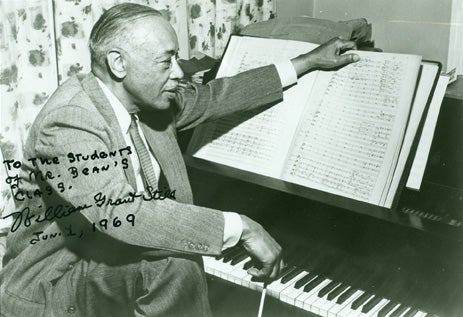
William Grant Still (1895-1978) was born in Mississippi and raised in Little Rock, Arkansas. He dedicated most of his career to portraying African-American folk music in a more dignified way by combining the Blues and Negro Spirituals with European traditional genres (symphony, concerto, opera, ballet, and chamber music). He believed that all folk music could be elevated through the use of these mediums to expose a wider audience to an art form that would be otherwise confined to local churches and communities. The chamber works of William Grant Still demonstrate the significance and sophistication of folk music by using traditional melodies from cultures within the United States and abroad.
String Quartet at Wilberforce
William Grant Still (seated in the far right with his violin) formed a string quartet in 1912 at Wilberforce University. He used this and many other small ensembles at Wilberforce to develop his compositional skill and technique.
Autograph Letter from Verna Arvey to Katherine Biddle
Verna Arvey (the composer's wife and manager) wrote Katherine Biddle on April 7, 1964, seeking advice on how to spark interest in Still's music, particularly their 1941 collaboration, Plain-Chant for America. Arvey also expresses to Biddle the disappointment that the Howard University Chorus, under the direction of Warner Lawson, would not consider performing any of Still's music.
William Grant Still Portrait, Inscribed to W. C. Handy
Portrait of William Grant Still from Volume I of his 1937 publication Twelve Negro Spirituals. Of importance is the inscription on the portrait, noting, "To my friend W.C. Handy to remind him of my gratitude for what he has done for Negro Music." Handy (affectionately called the "Father of the Blues") influenced Still's view that there was dignity in the Blues and that fusing music idioms of his heritage with the classical European tradition was an admirable goal.
Autograph Letter from Still to Katherine Biddle
William Grant Still wrote Katherine Biddle on March 23, 1963 to respond to her views on the plight of the contemporary composer. Still shares Biddle's perspective that the creative process of the American composer should be sincere and purpose driven, instead of musical stunts to garner short-term attention
William Grant Still
Still excelled on multiple instruments as a student at Wilberforce University. These skills helped Still establish himself as a performer on the violin, oboe, and cello.
Letter from Still to Katherine Biddle
In this handwritten letter, William Grant Still thanks Katherine Biddle for praying for his success as a "serious" composer. Still was a spiritual man who believed that his gift as a composer was designed to give all honor and glory to God. He inscribed a number of his compositions with the acknowledgement, "With humble thanks to God, the Source of inspiration."
Folk Suites
In 1962, William Grant Still composed several chamber works devoted to the music of the Americas. These works were written for a combination of strings, woodwind instruments, and piano. Each movement represents a distinct foreign or American folk melody. Still self-published the Folk Suites in his own hand. As a comparison, a modern edition published by Georgetown University Assistant Professor of Music Dr. Rufus Jones shows the different approach to the scoring of each instrument (flute, string quartet, and piano). Still uses a condensed score approach in comparison to the full score created by Dr. Jones. In 2009, William Grant Still Music published Dr. Jones' edition of The Collected Folk Suites of William Grant Still in three volumes.
Studies of Contemporary American Composers: William Grant Still
In 1925, J. Fischer & Brother Publishing, with John Tacker Howard serving as editor, began producing a series of booklets entitled Studies of Contemporary American Composers. This series was designed to give promising young composers much needed exposure. In 1939, William Grant Still was featured in this series, with Verna Arvey as author.
William Grant Still Photograph, Inscribed
For most of his career, William Grant Still was an advocate for music education in the public schools. In this 1969 portrait, Still acknowledged the class of Mr. Bean by inscribing a few words of appreciation. Several weeks later, Still sent Mr. Bean's class a brief musical excerpt from his 1953 work, Little Song that Wanted to Be a Symphony.








